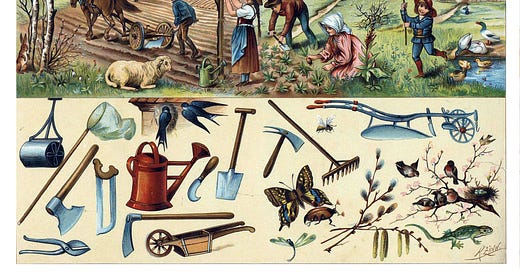The rise of veganism in America may seem like a recent trend, but it actually has roots that go back to the 19th century. By examining this time period closely, we can see that many people were already promoting the ethical and dietary principles that are now embraced by modern-day vegans. These forward-thinking individuals helped lay the foundation for the vegan movement that we see today.
This article takes a deep dive into the early history of veganism in the United States during the 1800s. It sheds light on the pioneers who were instrumental in shaping the movement in its early days. Despite being ignored in mainstream historical accounts, these trailblazers played a crucial role in developing a philosophy that not only persisted but also evolved into a significant cultural force over the years.
In 19th-century America, pioneers like Dr. William Lambe and early vegetarians sowed the seeds of veganism, embracing plant-based living and ethical choices. Their legacy, rooted in health, morality, and resistance to animal exploitation, shapes today's vibrant and compassionate vegan movement.
Vegetarianism and Ethical Concerns
The 19th century witnessed a burgeoning interest in vegetarianism, fueled by a confluence of health concerns, ethical considerations, and a rejection of the prevalent meat-centric diet. Figures like Sylvester Graham and John Harvey Kellogg championed plant-based diets, promoting the idea that abstaining from meat contributed to both physical and moral well-being.
Sylvester Graham: A dietary reformer who advocated for a simple, vegetarian lifestyle as a path to better health and morality. He believed that consuming meat led to physical and moral corruption, and promoted his signature graham crackers as a healthy alternative.
John Harvey Kellogg: Known for his breakfast cereals, Kellogg believed a plant-based diet was integral to achieving physical and spiritual purity. He established the Battle Creek Sanitarium, which served vegetarian meals and promoted healthy living practices.
The Rise of Veganism
As vegetarianism gained momentum, a subset of individuals began advocating for a more rigorous form of plant-based living. Among these early proponents was Dr. William Lambe, who, in the 1830s, abstained not only from meat but also from dairy and eggs. This marked a significant departure from traditional vegetarianism and laid the foundation for what would later be termed "veganism."
Dr. William Lambe: A physician who believed a diet devoid of all animal products fostered optimal health and aligned with ethical principles of non-violence. He argued that consuming animal products caused both physical and mental harm, and advocated for a diet based solely on fruits, vegetables, and grains.
The Vegan Society and Its Founders
The formalization of veganism as a distinct movement can be traced back to the mid-20th century with the founding of The Vegan Society in England. However, the 19th century in the United States saw the emergence of key figures like the Alcott House members, who abstained from all animal products, including leather and honey.
The Alcott House at Fruitlands: A utopian community established by Transcendentalists, including Bronson Alcott and Louisa May Alcott, which embraced a cruelty-free lifestyle. They practiced strict vegetarianism(ethical veganism), wore only plant-based clothing, and avoided using animal products in all aspects of their lives.
Religious Influences
Religious movements in the 19th century also played a role in shaping early veganism. Certain religious sects, such as the Seventh-day Adventists, embraced plant-based diets as part of their health-oriented practices.
Seventh-day Adventists: A Protestant denomination that emphasizes a healthy lifestyle based on biblical principles. They adopted a vegetarian diet in the late 19th century, influenced by the teachings of Ellen G. White, who believed that a plant-based diet promoted both physical and spiritual well-being.
Summary
While veganism as a distinct term and movement gained formal shape in the 20th century, the 19th century in the United States laid crucial groundwork. Visionaries who questioned the ethical implications of consuming animal products and advocated for a plant-based lifestyle planted seeds that would eventually grow into the thriving vegan movement we witness today. Understanding these historical roots provides valuable insights into the evolving landscape of ethical and sustainable living, reminding us that the seeds of change sown by the pioneers of the past blossom into the fruit of progress in the present.
Resources:
Books:
Dominion: The Power of Animals in Nature and in Our Imagination by Matthew Scully
Animal Liberation by Peter Singer
Eating Animals by Jonathan Safran Foer
A Billion Hungry Mouths: Feeding the World Without Consuming the Planet by Colin Tudge
Websites and organizations:
Documentaries:
Academic articles:
"The Case for Animal Rights" by Tom Regan
‘‘Why We Love Dogs, Eat Pigs, and Wear Cows: An Introduction to Carnism’’ by Melanie Joy
‘‘Animal Rights: The Abolitionist Approach’’ by Gary L. Francione
‘‘Fellow Creatures: Our Obligations to the Other Animals’’ by Christine Korsgaard
Receive a single informative article daily at 12:01 AM by email. For additional updates, explore my homepage with exciting content on vegan and plant-based news, coupled with delightful recipes. Stay connected to the vegan world and all it has to offer.
Visit The Vegan Project Global our Facebook page for more vegan outreach and education.
Also, visit our new YouTube channel




